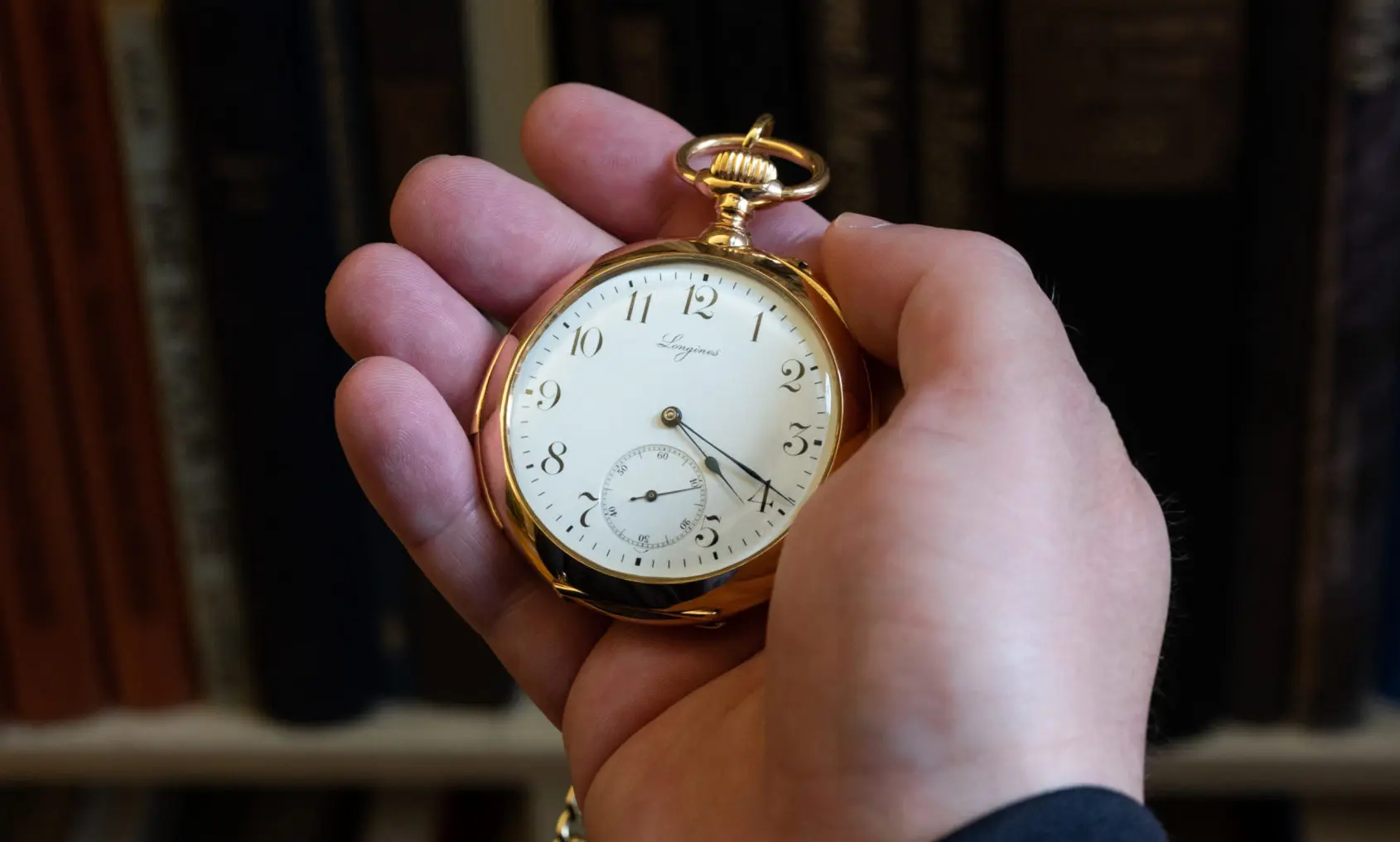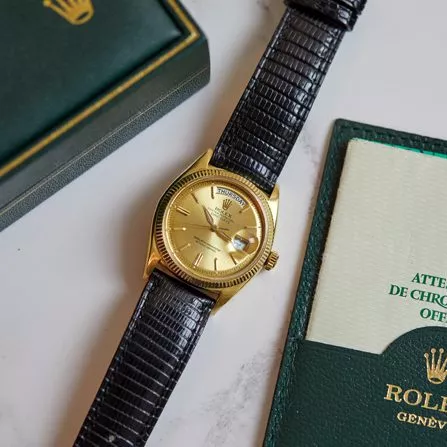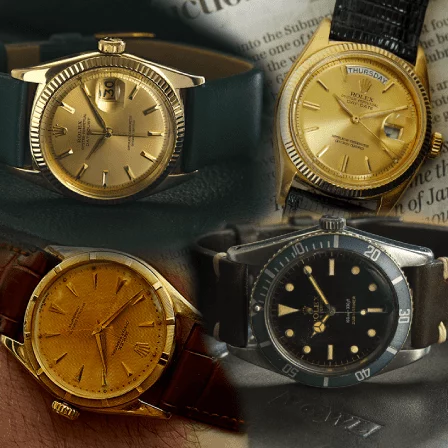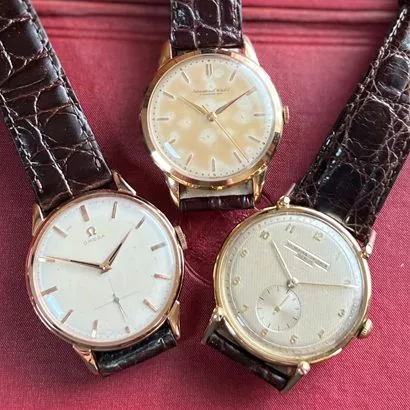ARE ANTIQUE AND VINTAGE
POCKET WATCHES WORTH COLLECTING?
Short answer, yes, absolutely. Just ask Erivan Haub, (well, sadly you can’t because he died in 2018). His incredible pocket watch collection, probably the most valuable in the world, is estimated to be worth between $15 to $27m.
With a 500-year head start on wristwatches, much of the ingenuity you see in today’s watches in terms of complications was originally introduced into pocket watches. Date, Minute Repeater, Chronograph, Moonphase, Tachymeter, Perpetual Calendar, all and more can be found in collectable pocket watches. Antique and vintage pocket watches hold a timeless charm that captivates collectors and enthusiasts alike.

Vintage Pocket Watches vs. Antique Pocket Watches: What’s the difference?
Vintage pocket watches were produced between the late 19th century and the mid-20th century. Collectors love these because they possess both charm and craftsmanship. They often incorporate intricate designs, high-quality materials, and unique movements.
Antique pocket watches are those that are over 100 years old. Their charm as bygone-era watches is a result of their rarity, quality and uniqueness. Imbued with exquisite craftsmanship, antique pocket watches employ traditional watchmaking techniques that are rare today. Collectors admire the historical value and the stories or provenance that these timepieces hold.
Reasons to Collect Antique and Vintage Pocket Watches
1) So many collectable names
One of the most exciting aspects of collecting vintage pocket watches is that they feature as many famous brand names as modern wristwatches, plus many more of which you may never have heard.
Working in workshops the length and breadth of industrial revolution Britain, famous British watchmakers include John Arnold & Son, and Edward John Dent, who also designed Big Ben. Then there’s Josiah Emery, famed maker of Lord Nelson’s pocket watch. Nelson used it to great effect by synchronising with other Naval officers’ watches to defeat the French and the Spanish at the Battle of Trafalgar in 1805. There’s also Charles Frodsham, George Graham, Thomas Mudge, and not forgetting George Daniels, hailed as the greatest watchmaker of his generation, but there are many more.
As for Swiss pocket watches, we have the French Wars of Religion in the 16th century to thank for skilled Huguenot watchmakers fleeing France for Switzerland. They brought with them their watchmaking skills thereby transforming Geneva into a world centre for highly skilled watchmaking which is still the case today. The leading Swiss brands, often responsible for the complications we know in wristwatches today, include Audemars Piguet, Breguet, IWC, Patek Philippe, Vacheron & Constantin, and Zenith; they all made their names with pocket watches.
Not surprisingly, vintage pocket watches from renowned watchmakers or those associated with significant historical events can command higher prices. Additionally, the scarcity of certain models or limited editions can make them highly valuable.
2) Made in an era built to last
Pocket watches made in the 1700s and right up to the mid-1900s were built to last, with gold, silver, or brass casements. These pocket watches can also feature the craftsmanship of a bygone era. This is craftsmanship often lost to the needs of today’s mass production techniques. They can include beautiful ornamental decorations such as engravings, hand paintings and elaborate filigree work.
Vintage pocket watches also have a great deal more space than your 40-mm sized wristwatch. This means there is more room to fully realise intricate designs and larger sub–dials.
3) A style all their own
Old pocket watches have a style all of their own. The pocket watch would sit comfortably inside the waistcoat pocket and would be retrieved by means of a gold chain to consult the time. It was a ritual for men to regularly check their pocket watch. It was considered a manly thing to do. Another enjoyable ritual was the daily habit of winding the pocket watch.
4) Worthy inheritance pieces
Traditionally pocket watches were extremely well made and were designed to be handed down from father to son through the generations. An example of this is the watch owned by Sir Winston Churchill. He inherited his Breguet Reference 765 pocket watch from his father, John Spencer Churchill. Unlike his watch, Churchill was a notoriously bad timekeeper. He always arrived late for meetings. The staff at his home would set the clocks 15 minutes in advance in an attempt to keep him on time.
But Churchill knew what they were about. Armed with his trusty Breguet, nicknamed ‘The Turnip’, he always knew the correct time and foiled their efforts to keep him punctual. The Turnip keeps excellent time to this day and has only been serviced once.

Advantages of Collecting Pocket Watches
- Historical value: Many antique pocket watches are historically important and coveted by collectors and enthusiasts alike because they relate to important events, people, or specific times.
- Aesthetic appeal: Pocket watches have a timeless appeal. They reflect the artistic sensibilities of each era. There are also highly collectable pocket watches with delicate filigree patterns and enamel decorations. They are modern reminders of a bygone era and are fascinating pieces.
- Unique and exclusive: Many fine pocket watches are rare and difficult to find, which adds to their appeal and value. Pocket watches often have their own provenance, with different designs, movements and origins.
- Investment potential: Similar to wristwatches, certain pocket watches, such as military watches, offer significant investment potential. Military pocket watches are designed specifically for military personnel and often feature luminous dials and rugged cases.
Additionally, limited or rare pocket watches from well-known watchmakers such as Patek Philippe, Vacheron & Constantin and Breguet have steadily increased in value over time. - Mechanical mastery of yesteryear: If you like timepieces with an audible tick, a pocket watch could be the collector’s item for you. From the oscillation of balance wheels to the precision of escapements, pocket watches represent an era when horologists pushed the boundaries of mechanical engineering.
- A link to the past: Pocket watches offer a sense of connection to the past, allowing individuals to carry a piece of history with them. Excellent as conversation starters, they can spark interest and admiration from others.

Disadvantages of Collecting Pocket Watches
- Cost and affordability: Pocket watches can vary significantly in price, and some high-quality or vintage models can be expensive. The George Daniels Space Traveller 2 pocket watch sold at auction for $4.32m.
- Condition and maintenance: Pocket watches, particularly antique ones, require regular maintenance and care to keep them in good working condition. The costs can add up over time, making it an ongoing expense for owners.
- Availability and authenticity: Finding a pocket watch that meets your criteria may be challenging. Additionally, the market is flooded with counterfeit pocket watches, making it crucial for buyers to thoroughly research and authenticate the timepiece before making a purchase.
- Limited functionality: Compared to modern wristwatches, pocket watches often have limited functionality. They typically display complications such as a date or small seconds sub-dial. For those who rely on additional features like alarms, timers, or fitness tracking they may be better served with a smart watch. Pocket watches, as the name implies, need to be kept in a pocket. There have been many instances of the pocket watch going through the wash cycle and being ruined.
- Investment risk/collectable value: You are buying old tech, so market trends, changes in demand, and the condition of the watch can impact its value. There is no guarantee of a profitable return on investment.
- Storage and display: Pocket watches require proper storage to protect them from damage. Factors such as humidity, temperature fluctuations, and exposure to direct sunlight can negatively impact their condition.

The Future Market for Pocket Watches
Despite their appeal, pocket watches have generally been overshadowed by the rising popularity of vintage wristwatches. Wristwatches look sleek on the wrist and can be quickly checked for time. Pocket watches on the other hand require removal from a pocket or bag.
Currently, there is a greater focus on wristwatches in the collector community, potentially diminishing the interest in pocket watches. However, as a direct result of this, there is still plenty of scope for some great pocket watch bargains provided you do your research.
As the years pass, the scarcity of well-preserved pocket watches is likely to increase especially as some dealers are melting down several pocket watches just for their gold or silver content. As for the future, it can be difficult to make definitive predictions especially when the younger generation are currently embracing smart watches.
Our Expert Tips on Collecting Vintage and Antique Pocket Watches
Collecting vintage and antique pocket watches is a fascinating hobby, but like all collecting, careful research yields the best results. Here are some of our top tips to consider when starting or expanding your collection:
Research:
Plenty of homework is essential. Familiarise yourself with the different brands, models, and their historical significance. Learn about the various movements (mechanisms) used in pocket watches, such as mechanical or quartz. There’s a wealth of information on the internet including forums, websites, and auction platforms, where collectors and experts share information and discuss pocket watches.
Budget:
Be prepared to invest a reasonable amount of money in acquiring quality pieces. Start with affordable pocket watches to begin your collection or if you have a limited budget. As your knowledge and budget expands, you can gradually pursue more valuable and sought-after timepieces.
Preferences:
Decide on which era and type of pocket watch interests you. A clearly defined collecting strategy will help you curate a collection that reflects your unique taste. Also, develop a sense for what you don’t want in your collection. Some collectors avoid watches in poor condition, those with non-original parts, or pieces with questionable authenticity.
Dealers:
Establish a rapport with trustworthy and knowledgeable watch dealers such as Vintage Gold Watches. They can really help to educate you. Look for vintage and antique pocket watch dealers with a good reputation within the collecting community. It’s a good idea to attend watch fairs, auctions, and trade shows where dealers and collectors gather.
Auctions and trade shows:
Auctions can be an excellent platform by which to acquire unique and rare pocket watches. But before attending, thoroughly research the watches on offer, their estimated values, and set a maximum bid within your budget. Trade shows and exhibitions allow you to explore a wide range of watches in one place, providing an opportunity to see, touch, and examine them up close.
Condition and authenticity:
Always carefully inspect for condition and authenticity. Look for signs of wear, damage, or repairs that may affect its value. Originality is highly prized, so be cautious of watches with replaced parts or significant alterations. When possible consult with experts or experienced collectors to help you identify any potential red flags or issues.
Closing thoughts
If vintage and antique pocket watch collecting becomes your passion, you are embarking on a horological journey with a long, fascinating and rewarding learning curve.
Here at Vintage Gold Watches we count ourselves among the experts you can consult, so do feel free to get in touch. If you don’t see what you want on our website please talk to us, because we may be able to source exactly what you are looking for.
Want to be kept informed about vintage watches and pocket watches on a regular basis? Of course you do, sign up for our entertaining weekly newsletter





